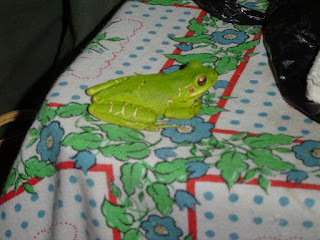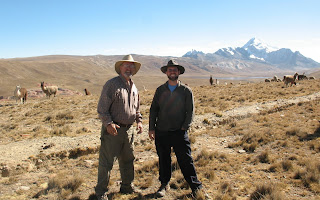Hello friends and family,
The first week of April has been so jam-packed with work and play and other things that we feel like it should already be May.
First, we finally reached a point in a project where we can say, "Done!" This is a first for us, even after 7 months in our assignments. In spite of what seem like huge accomplishments in getting water, latrine, and agriculture projects off the ground, only one of them has been taken to completion, and it was one that was half-finished when we got here! We mentioned in a previous post about the 100-or-so latrines in the area that were built a few years ago by a business but that are completely useless, due to missing and poorly-made parts. Well, two community groups are now well on their way to finishing the job, and our first finished product was the latrine for a school in one of those communities. Here is the bathroom the kids were using (or not using, because they were too scared to go in it):


And here is what they have now!


The kids enthusiastically report that it is "very easy!" which I think means they like it.
We also got to help celebrate the completion of another MCC project in the area. Our boss and our boss´s bosses came up to visit us and celebrate as well. We all trucked down to Pampa Negra, a small community in our county where our co-worker Juan has worked for two years to help build systems to capture water from roofs of the 16 homes in the community. The area is basically a desert, with some "rainy seasons" only bringing two or three showers. The people used to use water from the river, which is often turbid and salty. Here is Juan showing a before and after sample:

And our boss's bosses cutting the ribbon:

And Juan's son José toasting to a job well done:

And of course there was food! This is a wheelbarrow full of raw goat meat. Oh yum! (Actually yes, it was very yum after it was cooked.)

The party to celebrate the finished project was, sadly, also to say goodbye to Juan and his family. After 10 years of MCC service, they are moving back to his wife's hometown to raise vegetables and, I imagine, enjoy a slightly more hospitable climate. Best wishes - the newly small and childless Moro Moro team will miss you!
After our visitors left, we enjoyed approximately 3 hours of rest before we went back to work, and we feel like we have been working our tails off since. Thankfully there seems to be a reward for all this work around every corner. Yesterday we were laying pipe (me) and building a filter (Andy) for one of our new projects. Last night, after what seemed like an entire day of lugging heavy things up and down muddy hills, we came back to one family's home to find the women of the house hovering around their outdoor mud oven. We hadn't stood there two minutes when Sélida, the mother of the group, pulled dozens of steaming hot, delicious cheese-corn tamales out of the oven. THEN, her husband, son, and daughters started loading huge pans (metal hammered into a pannish shape by herself, of course) of bread out of the kitchen to be baked. Because it was getting reaaaaally chilly, her 5-year old grandson then started stoking a fire using the ashes they had pulled out of the oven, so we all stood around eating fresh bread and tamales and warming our dirty feet by his little fire (wish we had pictures of this!).
To finish up, here are some other cool things about April so far:
Hammock time (not much yet, but quality):

This frog we found on our patio table:

(We think it used to live off the bugs that hung around the light that Andy moved from its former position near our lemon tree to light our table.)
The discovery that oat fields viewed from a certain angle sort of look like green water:

A link to the MCC website featuring an Easter article written by our co-worker, with a podcast of The Old Rugged Cross sung in Spanish by Andy's former Spanish teacher:
http://mcc.org/stories/podcasts/easter-song-bolivia
Thanks for joining us!













 Here's two of the kids of the household and their house. They're holding Flat Stanley, a paper doll thingy that we were taking along as part of my nephew's 2nd-grade class project.
Here's two of the kids of the household and their house. They're holding Flat Stanley, a paper doll thingy that we were taking along as part of my nephew's 2nd-grade class project.


















